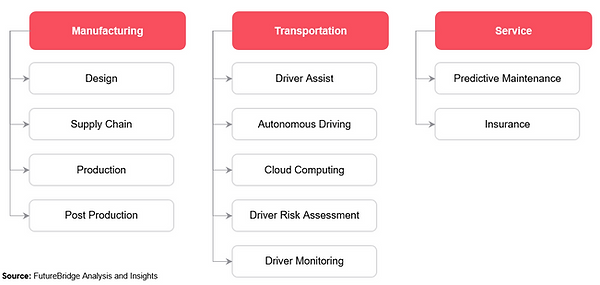
Perhaps AI use cases in Automotive have been loud enough to reach everyone more specifically with the self-driving cars hype, but the industry has a long track record for harnessing latest technologies to bring efficient, innovative and safe vehicles to market, while continually working to cut manufacturing costs.
Automotive manufacturers implement a range of human-machine interface technologies (HMIs), including voice controls, interior-facing cameras, touch-sensitive surfaces, and smarter, personalized platforms.
AI role in the Automotive Value Chain:
Currently, AI is being implemented in automotive manufacturing, including design, supply chain, production, and post-production. In addition, AI is being implemented in ‘driver assistance’ and ‘driver risk assessment’ systems, which is transforming the transportation sector. Aftermarket services such as predictive maintenance and insurance are also transforming through the usage of AI.

The potential for AI in the Automotive Industry
Manufacturing
Robots are simultaneously working with human and learning automotive manufacturing skills (design, part manufacturing, and assembly) with the help of AI. Currently, AI helps humans to develop cars using Exoskeletons; in the future, the entire plant can be operated by these AI-powered robots.
1
Transportation
AI is revolutionizing the transportation sector. Currently, AI is playing a vital role in driver assistance technology, and it is being used widely in modern vehicles. Currently, Tesla is offering level 2 autonomous cars, and the company is planning to launch level 4/5 autonomous vehicles by the end of 2020. AI can be used to monitor the driver’s eye – whether one is sleeping/tired or not.
2
Services
AI can play a significant role in aftermarket service. Currently, many AI applications predict the problems related to engine performance, battery performance, etc. that may occur in the future. In addition, there are many AI-powered insurance providers who offer quick services i.e., in availing insurance and claim settlements, to customers.
3

